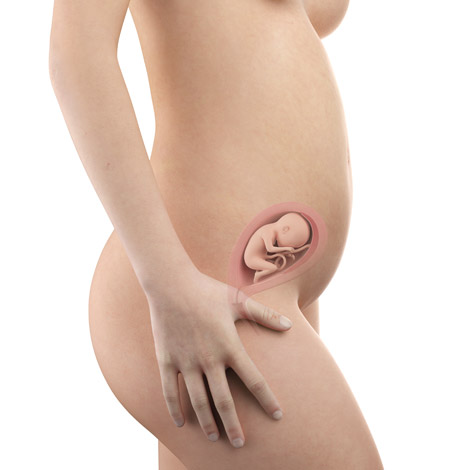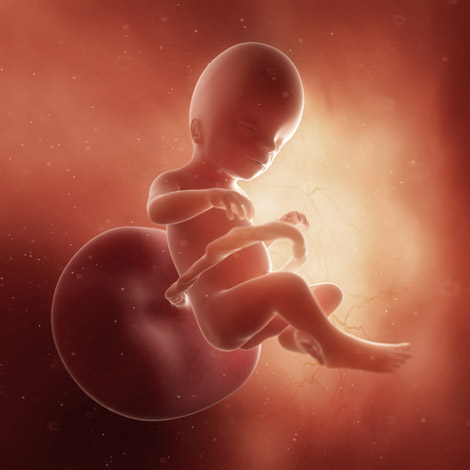Your baby this week
GRAMS IN WEIGHT
His arms and legs are reaching their proper proportions.
Lots of kicking is going on whilst he still has the space.
He’s swallowing more amniotic fluid now.
How big is your baby?
Week 20 of pregnancy sees your baby being measured in a different way. Up until now, all of his limbs have been tightly curled up, making it very difficult to measure his length so his size has been estimated head to bottom (crown to rump). Now that he’s grown enough for his limbs to uncurl, the measurement is taken from head to heel. A fetus in week 20 will weigh around 300g (10 ½ oz) and measure 25.4cm (10in) – the size of a banana.

How big is your baby?
Week 20 of pregnancy sees your baby being measured in a different way. Up until now, all of his limbs have been tightly curled up, making it very difficult to measure his length so his size has been estimated head to bottom (crown to rump). Now that he’s grown enough for his limbs to uncurl, the measurement is taken from head to heel. A fetus in week 20 will weigh around 300g (10 ½ oz) and measure 25.4cm (10in) – the size of a banana.

What does your baby look like?
He will be covered in a layer of vernix, a white waxy substance which protects his delicate skin from the acidic properties of amniotic fluid. His arms and legs are reaching their proper proportions, although his head is still the largest part of his body. A 20 week fetus is still very skinny – the next few weeks are all about plumping up as he lays down more fat deposits. No wonder you’re hungry!
Changes in your body this week
You might find this week that your hair and nails grow faster and feel thicker. This is all courtesy of the pregnancy hormones which are triggering extra nutrients to be released to the hair and nail cells. Your uterus has grown to be about level with your belly button now. You’ve probably gained around 10lbs in weight and will continue to gain around a pound per week from now on.
How your baby is developing
He’s swallowing more amniotic fluid now which is preparing his digestive system for starting work after the birth. Meconium is forming in his bowels, and what does that mean? That your baby is already generating the product for his first dirty nappy!
In a girl, the uterus has finished growing now and in a boy his penis is distinct and his testicles are continuing to develop, though they haven’t dropped out of the abdominal cavity just yet.

How your baby is developing
He’s swallowing more amniotic fluid now which is preparing his digestive system for starting work after the birth. Meconium is forming in his bowels, and what does that mean? That your baby is already generating the product for his first dirty nappy!
In a girl, the uterus has finished growing now and in a boy his penis is distinct and his testicles are continuing to develop, though they haven’t dropped out of the abdominal cavity just yet.

His movements are on the increase too, lots of twirling, kicking and waving is going on whilst he still has lots of space.
Health concerns
You should be ensuring that you’re eating a diet rich in iron in order to facilitate the maximum haemoglobin production (the oxygen-carrying red blood cells). The baby, placenta and your own increased blood volume mean that your body is in need of more iron than before. Good sources are found in red meat, poultry, soy-based products, iron-fortified cereals, prune juice, spinach and raisins.
Are there any symptoms you should be looking out for?
Numbness, tingling or a dull ache in your hands, wrists and fingers could all be signs of carpal tunnel syndrome. This is often diagnosed in pregnant women, especially if there are repetitive hand movements, during work for example. It can spread to the upper arm and forearm and in severe cases it can cause weakness in the hand. If you’re going to develop carpal tunnel syndrome, it will usually be in the second half of the pregnancy because that’s when the greatest fluid retention occurs.
Safety first
If you have pets living with you, now is the time to start thinking about how best to keep you and your baby safe. First and foremost, you should already have stopped emptying litter trays and dealing with poo picking as the risk of being infected with toxoplasmosis is extremely dangerous for pregnant women.
Planning ahead, however, you should never leave your baby alone with an animal, and there are a number of steps that you can take to properly safeguard everyone in the household. Think about having designated, pet-free areas – baby gates are very versatile in these situations. You can also buy special nets to stretch over cots and Moses baskets, etc. protecting the baby from cats searching for a cosy place to sleep. If you feel in need of further information regarding your pets and your baby have a read of our Pets and Babies article or give your vet a call as they’re very likely to have helpful information that you can absorb before the birth.

Important issues this week
Week 20 is the time for you to look up, and think about registering for, a childbirth class, especially if this is your first baby. Lots of these are run by the NCT (National Childbirth Trust) and they provide a plethora of information about pregnancy, birth and postnatal care. And don’t forget that you’ll meet lots of other expectant mums who are also at your stage of pregnancy – which can be an invaluable source of help, advice (and sympathy!) once the sleepless nights and teething start up following the birth.
Keeping fit, staying healthy
Keeping fit and active in pregnancy is very important as your body gears up for the challenge of birth. You’re halfway through now! Or possibly more than, if you deliver early. Exercise with a bump isn’t the easiest though, especially if you’re suffering from the all too common pregnancy pelvic girdle pain. If you’re finding discomfort is really getting in the way of a decent exercise routine, you can request a referral to a physiotherapist who will teach you techniques for minimising any pain. You could also invest in a pregnancy support belt, or maternity band, as your bump grows ever-larger, to support the extra weight you’re carrying around.
Looking forward; planning ahead
Carrying your baby for nine months, and feeling him wriggling around inside you multiple times per day, allows you to become very bonded to him before the birth. And although the dad-to-be will be able to feel the kicks on the outside of your tummy, it’s no comparison really. So it might be worth investing in a 4D scan for the later stages of your pregnancy. These in-depth scans allow a real-time glimpse into the secret world of your baby. You’ll be able to see what he’s doing in the womb, how he’s moving and whether he’s sucking his thumb or nuzzling into the placenta. You can also take away photos and DVDs of the scan; all of this can help kick-start the father-baby bonding before the birth.



